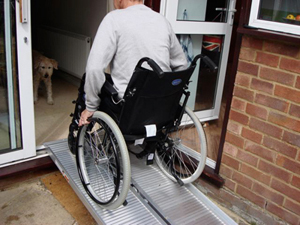

Motor Vehicle Accident
Pre-Discharge Hospital Assessment
Physical, cognitive and psychological changes sustained as a result of an accident, can impact your lifestyle, as well as your family members,
once returning home. If you now require use a wheelchair for mobility and live in a home with stairs at the outdoor entrance, you might be left
with the questions of how will you be able to get inside of your home. Short-term memory deficits can impede your ability to use your stove or
microwave safely. Or perhaps you have been told that you will require a walker or crutches before leaving the hospital, what vendors do you call
and how much will it cost?
IM-OT provides occupational therapists that will come to the hospital, coordinate with the inpatient medical staff, and go to your home to assess
your functional needs and ensure a plan of care is put in place prior to you leaving the hospital.
Form 1: Assessment of Attendant Care Needs
 The Statutory Accident Benefits Schedule (SABS) of Ontario's Insurance Act sets out a provision for an Attendant Care Benefit for eligible
claimants who have been injured in a motor vehicle accident. Access to this benefit can be obtained with submission of an Assessment of Attendant
Care Needs (Form 1) to the insurer that is completed by an authorized by law health profession. IM-OT provides licensed occupational therapists that
are well suited to complete attendant care assessments given their training in functional adaptation within the context of physical, cognitive and
psychosocial dysfunction (OSOT, 2009).
The Statutory Accident Benefits Schedule (SABS) of Ontario's Insurance Act sets out a provision for an Attendant Care Benefit for eligible
claimants who have been injured in a motor vehicle accident. Access to this benefit can be obtained with submission of an Assessment of Attendant
Care Needs (Form 1) to the insurer that is completed by an authorized by law health profession. IM-OT provides licensed occupational therapists that
are well suited to complete attendant care assessments given their training in functional adaptation within the context of physical, cognitive and
psychosocial dysfunction (OSOT, 2009).
In Home with Recommendations for Assistive Devices/Equipment
IM-OT provides occupational therapists that will provide an assessment of your home environment. Whether you reside in a two-storey house,
apartment, long-term care or retirement facility; every home requires a thorough assessment to ensure a safe environment.
Occupational therapists will collaborate with you to determine required equipment or assistive devices that are required to ensure safety in
your home. Previous ability to perform your own self-care tasks can be made easier by providing devices to assist with getting dressed, self
grooming, toileting, feeding and bathing. Housekeeping and home maintenance can be enabled through use of long handled and lightweight equipment.
Home Modifications
 Home modifications can often play a crucial role in deciding whether to remain in your home or relocate as a result of sustained accident
related injuries. It is often hard enough to deal with how an accident has functionally impacted you, but now the thought of having to leave
the comfort of your own home can contribute to emotional distress.
Home modifications can often play a crucial role in deciding whether to remain in your home or relocate as a result of sustained accident
related injuries. It is often hard enough to deal with how an accident has functionally impacted you, but now the thought of having to leave
the comfort of your own home can contribute to emotional distress.
However, with IM-OT, we help to keep you in your home by adapting your environment to suit your needs. Building an outdoor ramp to assist
with wheelchair accessibility, a customized stair lift to accommodate a winding staircase in a two storey home, creating a walk-in tub to
prevent falls are just some of the physical adaptations that can be implemented. Additionally, technology also informs the type of renovations
that may be needed, electronic operating doors, lights that are operated by a switch of a handheld button, stoves that shut off with a timer to
allow safety when cooking.
Our occupational therapists assist with providing safety in combination with comfort to assist with coping with sustained accident related injuries.
The goal will be to maximize your ability despite the perceived disability.
Cognitive Rehabilitation
 The human eye often easily identifies a physical injury; perhaps someone is using a cane, a walker or even wheelchair to assist with his or
her ambulation. It becomes frustrating when someone presents well physically and yet with further interactions you find that there is in fact
something wrong. Motor vehicle accidents often occur with minimal investigation into how an individual's cognition may have been affected.
Suddenly things that were easily remembered before the accident are now easily forgotten. Missed medical appointments and an increase in frequency
of misplaced items have now become routine on a daily basis.
The human eye often easily identifies a physical injury; perhaps someone is using a cane, a walker or even wheelchair to assist with his or
her ambulation. It becomes frustrating when someone presents well physically and yet with further interactions you find that there is in fact
something wrong. Motor vehicle accidents often occur with minimal investigation into how an individual's cognition may have been affected.
Suddenly things that were easily remembered before the accident are now easily forgotten. Missed medical appointments and an increase in frequency
of misplaced items have now become routine on a daily basis.
IM-OT has occupational therapists that will perform the necessary cognitive assessments
to determine the functional needs of their clients. Interventions may include remediation techniques, compensatory strategies or even adaptations to
an individual's environment to assist with maximizing their independence. Additionally, assistive technology can play a crucial role in providing
visual and auditory reminders to complete tasks and to simplify activities of daily living.
Mobility Aid Assessment and Prescription
Mobility prescription can be an intricate part of the rehabilitation process following a motor vehicle accident. IM-OT has occupational therapists that are Assistive Device Program (ADP) authorizers that can assist with government funding of walkers, scooters, manual and power wheelchairs. Their expertise in collaboration with your meeting your care needs will help you to obtain the safe mobilization for indoors and within the community.
Job Site Assessment and Gradual Return to Work Services
 Occupational therapists at IM-OT provide job site assessments after a motor vehicle accident to ensure that your current functional abilities
match the demands the job. A work site assessment and physical demands analysis are conducted to properly address if the job continues to be an
appropriate fit for client. Once deemed safe, therapists will then develop a collaborative plan for the gradual return to work. This may include an
ergonomic assessment and implementation of a healthy work space, education regarding proper postures and body mechanics, energy conservation strategies,
modified hours and duties with gradual return to full capacity as deemed appropriate between the client and employer.
Occupational therapists at IM-OT provide job site assessments after a motor vehicle accident to ensure that your current functional abilities
match the demands the job. A work site assessment and physical demands analysis are conducted to properly address if the job continues to be an
appropriate fit for client. Once deemed safe, therapists will then develop a collaborative plan for the gradual return to work. This may include an
ergonomic assessment and implementation of a healthy work space, education regarding proper postures and body mechanics, energy conservation strategies,
modified hours and duties with gradual return to full capacity as deemed appropriate between the client and employer.
Future Cost of Care Analysis
This is a comprehensive report detailing the expected costs that a client may likely occur after sustained injuries from a motor vehicle accident. Our occupational therapists are trained to assess the holistic needs of clients and are therefore the most suited to conduct a future cost of care analysis. The occupational therapist will gain insight from the multidisciplinary team of health professionals involved in a client's ongoing care and document their forecasted treatment costs. This legal document is an excellent means of providing insight into the clients current deficits and the physical, cognitive and or emotional impact that may catastrophically affect his or her life forever.




